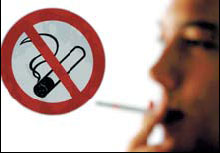IN BRIEF (Page 19)
Piercings pose dental problems
Body piercings, especially to the lips and tongue, can cause serious dental complications, research by the University of Tel Aviv has shown.
In the study of 400 consecutive patients, aged 20 years on average, every fourth person with a piercing in the tongue or lips revealed symptoms such as gum bleeding.
About 13.9 percent had broken teeth or other dental complications, the study found.
Dental professionals were warned of the increasing number of patients with oral piercings and to provide appropriate guidance to patients regarding the health risks.
Risks from silent thyroid
People who have an underactive or overactive thyroid without symptoms appear to have a modestly increased risk of heart disease. The data suggests that silent or "subclinical" thyroid dysfunction "might represent a potentially modifiable - albeit modest - risk factor for coronary heart disease and mortality", Dr Nicholas Rodondi, from the University of Lausanne in Switzerland, and colleagues wrote in a report.
Quitting smoking contagious

Nothing may feel lonelier than trying to quit smoking, but in fact, people kick the habit in clusters, US researchers said. The same team of experts who found that obesity may be socially contagious said they found similar patterns among smokers, with people clearly influencing others in their social and family networks.
Skip the pretzels
Starving yourself before a long flight may help prevent jet lag, US researchers said. Normally, the body's natural circadian clock in the brain dictates when to wake, eat and sleep, all in response to light. But it seems a second clock takes over when food is scarce, and manipulating this clock might help travelers adjust to new time zones, they said.
Babies need no water
Babies younger than six months old should never be given water to drink, physicians at the Johns Hopkins Children's Center in Baltimore reminded parents. Consuming too much water can put babies at risk of a potentially life-threatening condition known as water intoxication. "Even when they're very tiny, they have an intact thirst reflex or a drive to drink," Dr Jennifer Anders, a pediatric emergency physician at the center, said. "When they have that thirst and they want to drink, the fluid they need to drink more of is breast milk or formula."
Shutdown risk for sleepless
Being deprived of sleep even for one night makes the brain unstable and prone to sudden shutdowns akin to a power failure - brief lapses that hover between sleep and wakefulness, researchers said. "It's as though it is both asleep and awake and they are switching between each other very rapidly," said David Dinges of the University of Pennsylvania School of Medicine, whose study appears in the Journal of Neuroscience.
New gum targets bad breath
Magnolia bark extract - a traditional Chinese medicine - may be the newest weapon in the war on bad breath. Chewing gum maker Wrigley said recently it has added the compound to their Eclipse gum and mints. The hope is to not simply mask bad breath, as most strongly flavored mints and gums do, but to kill odor-causing bacteria.
Diet, exercise, fights diabetes

Lifestyle changes, such as drinking less alcohol, eating more vegetables and exercising, can prevent or delay the onset of diabetes, researchers said. Diet and exercise reduced the incidence of diabetes by about 43 percent over 20 years among 577 high-risk Chinese adults, the researchers reported in the medical journal Lancet.
Agencies
(China Daily 05/28/2008 page19)














